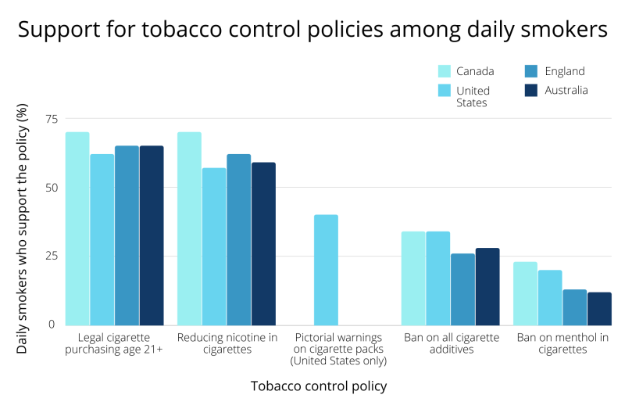Tobacco control policies correspond with a reduction in smoking prevalence and tobacco-related harms. Adoption of such policies is influenced by public opinion. Lobbyists who oppose tobacco control policies often claim these policies lack public support. But do they? This week, ASHES reviews a study by Tracy T. Smith and colleagues that examined the level of support for different tobacco control policies among daily cigarette smokers in four countries.
What were the research questions?
What is the level of support for five tobacco control policies among daily cigarette smokers in four countries? Does support for these policies vary by country? Does support for these policies vary by the smoker’s demographics or smoking behavior?
What did the researchers do?
The researchers analyzed data from a sample of 8,165 daily cigarette smokers in four countries (Australia, Canada, England, and the United States). Respondents were asked to indicate whether they support five tobacco control policies: (1) ban on menthol in cigarettes, (2) ban on all cigarette additives, (3) reducing nicotine in cigarettes if other nicotine products were available, (4) raising the minimum legal age to purchase cigarettes to 21 years and older, and (5) requiring pictorial health warnings on cigarette packs (United States participants only).1 Respondents also reported their demographic characteristics, smoking behaviors (e.g., heaviness smoking index) and perceptions, and intentions to quit. The researchers calculated the prevalence rates for the level of support for each policy by country. They used logistic regression to examine differences in support for each policy by participant demographics and smoking variables.
What did they find?
The majority of daily smokers in all four countries supported raising the minimum legal age to purchase cigarettes to 21 years and older (62-70%)2 and reducing the level of nicotine in cigarettes (57-70%). Banning menthol in cigarettes received the least amount of support from daily smokers in all four countries (12-23%). A minority of daily smokers supported banning cigarette additives (26-34%). Forty percent of daily cigarette smokers in the United States supported pictorial health warnings. Support for each policy was highest in Canada (see Figure). Daily smokers with the lowest heaviness smoking index and those who reported wanting to quit in the next six months were most likely to support all policies. Respondents who believed nicotine to be harmful to their health were more likely to support reducing nicotine in cigarettes. Young adults (age 18-20) were less likely to support raising the minimum legal age to purchase cigarettes. Flavored cigarette smokers were less likely to support a menthol ban and additive ban.

Figure. Support for tobacco control policies among daily smokers in four countries. From most supported to least supported policy. Adapted from Smith et al., 2021. Click image to enlarge.
Why do these findings matter?
Policymakers take public attitudes into consideration when deciding how to intervene to change behavior, such as through tobacco control policies. Findings from this study demonstrate certain tobacco control policies have high acceptability, countering claims from lobbyists that these policies are unpopular. However, even for policies with lower support (e.g., banning menthol or other additives in cigarettes), the lack of support might be attributed to lack of general public understanding of the role of these factors in addiction. Correcting misunderstandings and increasing awareness of the benefits of such bans might increase support for these policies.
Every study has limitations. What are the limitations of this study?
Respondents might not have fully understood each policy or its implications. For example, limited awareness of the role menthol plays in addiction might influence support for this policy. High levels of support for raising the legal cigarette purchasing age to 21 years and older might simply be attributed to the majority of the sample being 25 years or older, and therefore not impacted by this particular policy. Finally, this study only examined daily smokers’ support of these policies but cannot be generalizable to non-smokers or infrequent smokers.
For more information:
SmokeFree offers tools and tips for quitting and maintaining abstinence from smoking tobacco. The Centers for Disease Control and Prevention also provides research and tips about cigarettes and how to quit. For additional self-help tools, please visit the BASIS Addiction Resources page.
— Kira Landauer, MPH
What do you think? Please use the comment link below to provide feedback on this article.
________________
[1] Pictorial health warnings were already implemented in Canada, England, and Australia.
[2] Ranges represent the lowest and highest prevalence of support for the policy. At the low end, 62% of respondents from the United States supported raising the minimum legal age to purchase cigarettes to 21 years and older whereas 70% of respondents from Canada supported the policy. Sixty-five percent of respondents from England and Australia supported the policy.




